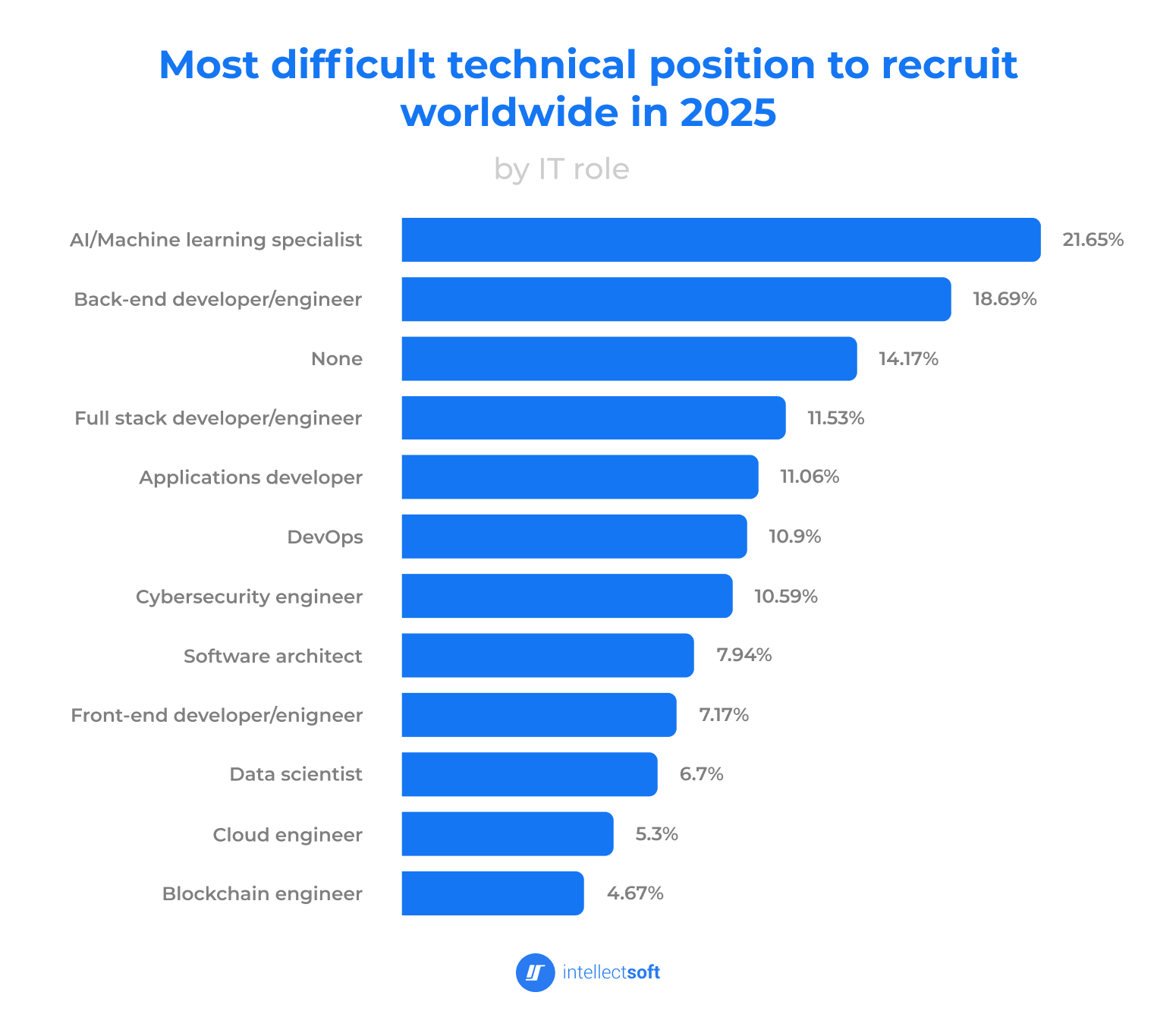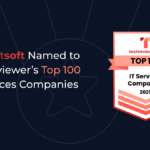When people hear ‘dedicated team,’ they often assume it’s just about hiring remote experts, handing them off to the client, and calling it a day. But that’s not how it works – at least, not when you do it right.
At Intellectsoft, we take a different approach. The dedicated team model isn’t just about filling positions; it’s about integrating top talent into your team and making sure they grow, contribute, and drive your business forward. And we’re here to break the myths and show you exactly how companies in the U.S. and Europe are using dedicated teams to their best advantage.
What Is a Dedicated Team?
The dedicated team allows businesses to bring in external specialists who work remotely but are fully integrated into their internal teams.
Unlike the traditional outsourcing models, where the external provider manages everything, the dedicated team model lets businesses stay in control while getting the extra expertise they need.
Let’s go over some quick Q&A to make it clear what a dedicated team is, how it benefits businesses, and why it’s different from what many people think.
How An Dedicated Team Works
- Finding the Right Tech Talent – The company selects specialists based on the requirements of the project.
- Joining the In-House Team – The hired experts become part of the company’s team and follow its processes and leadership.
- Ongoing Support – The outsourcing provider, like Intellectsoft, takes care of payroll, HR, and admin tasks – but that’s not all. We also help specialists grow, guiding them as they move into new roles (we will provide examples later in the article.)
- Closing the gaps – we are also engaged in optimizing processes so your engineers can focus on their work instead of spending time creating checklists and organizing workflows.
Where Is a Dedicated Team Most Effective?
Dedicated team model works best in industries that need niche expertise, flexibility, and the ability to grow quickly, such as:
- Software Development Companies / Product Companies – Developers, DevOps engineers, QA specialists, and data scientists.
- Healthcare & Fintech – IT specialists who understand strict regulations and make sure to comply with them.
- E-commerce & Retail – Developers for online platforms.
- Automotive & AI – Machine learning (ML) and embedded software engineers.
- Hospitality & Entertainment – Tech teams for digital platforms (guest platforms, loyal programs, online entertainment business, many more)
The dedicated team model is especially useful when companies need to cut expenses, but at the same time, there is a continuous need for innovation to win customers, tap into a new segment, etc.
It helps businesses find top experts faster, reduce hiring risks, and grow their teams without losing control over their work.
Unlike team extension, where an independent group of talents works separately, specialists in the dedicated team become part of your team and follow your processes.
Note: You can mix and match both models to get the best results.
Our Solution Architect, Alex Tyschenko, shared an example of how our client (under NDA) mixed both a team extension model and a dedicated team:
The biggest challenge was the time zone difference. The client realized that mixing different collaboration models would make things more efficient. Some team members were on the client’s side, while others were on ours. The client had three teams in total, each working across different time zones and cultures every day.
Key Benefits of An Dedicated Team Beyond Hiring
Dedicated team is not just about hiring – it offers many other advantages.
Our PM, Yuliia Bilyk, shared how this model benefits our clients:
Dedicated team helps clients save time – one of their most valuable resources. One major challenge in hiring is that technical interviewers often spend over 50 hours recruiting a team. That’s time they could have spent on actual work, leading to wasted money and long hiring processes. We handle this process for our clients, taking the stress off their shoulders.
Key Benefits:
- Save time and resources – Faster hiring and reduced workload for internal teams.
- Access to highly specialized talent – Find experts in niche fields quickly, even those that are hard to find.
- Reduce risks – Cut recruitment costs and reduce hiring risks.
- Scale and stay flexible – Expand or reduce teams as needed.
- Retain knowledge – Build long-term relationships with skilled professionals.
- Transition Talents Without a Hassle – Grow specialists into higher positions and leadership roles if needed.
- Maintain control – Keep direct management over external team members.
How We Support Professional Development
We make sure that our specialists maintain high quality and continue to grow professionally. If a client needs someone with additional skills, we take responsibility for training and upskilling them.

Source: Statista
According to industry data, AI & ML specialists are among the hardest to recruit, with 22% of companies struggling to hire them. What makes us different is that we train our specialists for the most challenging roles and help them transition into similar positions.
Our PM, Yuliia Bilyk, shares an example:
We are currently helping a Python developer for our client transition into an MLOps specialist. This development is part of their personal growth plan. Another example is when a client wants to prepare someone for a Team Lead role – we provide training to improve their soft skills. We also make sure that our specialists continuously learn and improve, keeping them sharp and motivated. This takes another burden off the client.
How U.S. and European Companies Use A Dedicated Team Model
The dedicated team helps businesses reduce hiring risks by ensuring they get highly qualified specialists, not random hires.
This is especially important for startups, which often lack structured hiring processes. We support them in rushing and constantly changing environments, where high employee turnover can be a challenge.
A few more benefits:
- Work with top experts – Our specialists have the technical expertise to add value to your business. They understand where you have gaps and will advise you on how to fill them properly while prioritizing solutions to make sure your system functions optimally.
- Continuous training & development – We invest in our specialists’ skills to keep them ahead. If you need to transition some experts into higher hierarchical roles, we will take care of it.
- Strategic tech planning – We step in when external expertise is needed.
We make sure to provide you with experts who are proactive and independent.
Yuliia Bilyk shares an example:
For Deltager, we have four specialists working in a dedicated team model. They are not only part of the client’s team but also involved in strategic planning. When the client needed external expertise for a design audit, we stepped in to help. In the future, we also plan to assist them with their migration to Azure. Having a reliable outsourcing partner means access to technical knowledge and solutions that the company may not have in-house, reducing risks.
Best Practices for Maximizing the Value of Dedicated Teams
What Our Team Brings to the Table:
- Technical expertise that adds extra value – Helping to prioritize. If you lack technical expertise, you may need someone to guide you on where to start, what should be done immediately, and what can be scheduled for later.
- Result-Oriented Approach
- Continuous Learning & Development
- Leadership – If you’re looking for leaders in your tech projects, we’ve got you covered. We train and develop our specialists to take on leadership roles.
How To Maximize The Value:
- Team Integration – Make sure that the dedicated professionals are part of the core team. They receive the same requirements and are kept in the loop.
- Communication & Collaboration Tools – Using the right platforms to allow straightforward communication and teamwork.
Our Solution Architect, Alex Tyschenko, shared:
Communication is the foundation. It is important to create mechanisms that facilitate straightforward collaboration. A well-defined process is the backbone of successful teamwork. Using Scrum and other Agile methodologies, clearly defining roles and responsibilities within the team, establishing a structured approach to resolving issues, and removing blockers are key elements of an effective workflow. A team needs strong leaders who oversee processes and drive communication. Without well-structured processes, interactions become chaotic.
- Clear Goals & Expectations – Setting KPIs and performance metrics is important. Without them, it will be difficult to stay on track, leading to misalignment and chaos.
What to Look for in Outsourcing Partner
“When choosing an outsourcing partner, experience with similar projects and long-term client relationships is key.
For example, one of our clients (under NDA) worked with multiple vendors before deciding to stay with us. We have been working with them for six years, which shows reliability and professionalism. It’s also a good idea to check reviews from other clients and see if they recommend the vendor.” – shared Yuliia.
Breaking the Myths About Dedicated Teams
Some people assume that a dedicated team means a company simply provides a specialist and then forgets about them. That’s not how we operate.
“We don’t just check in once a month to process payroll. We stay in constant contact with our specialists, gather feedback from both clients and our team, and actively help improve work processes.
We also advise clients on how to make their teams more efficient. Our involvement runs deep, even within an extension setup.” – shared Yuliia.
Can A Dedicated Team Be a Strategic Advantage?
“Yes,” said Yuliia, “especially when a company doesn’t just provide people but also offers expertise.”
Having a reliable outsourcing partner brings technical knowledge and solutions that the company may not have in-house, lessening risks and skyrocketing capabilities.
What Makes a Great Specialist?
As Yuliia shared:
“The best specialists are proactive and independent (even being a team extension, these qualities are musts). They don’t just follow orders – they constantly add value. They suggest new technical solutions and improvements. Strong communication skills are also very important. Since all our clients are English-speaking, specialists must be open and comfortable working in an international team.”
Challenges and How to Overcome Them
One of the main challenges in outsourcing overall is cultural and time zone differences. Here’s how we address them. It starts at the very beginning; during the hiring process, we make sure that our professionals are well-prepared to work in a multinational environment and have strong communication skills. You can’t do anything without both of these for building strong, trusted relationships.
As Alex shared, processes play a central role in driving communication. The first step is to establish strong processes and assign capable leaders to oversee them.
Remember: Checklists don’t replace processes. A structured process is necessary. Checklists are just tools, but a strong process ensures everything runs smoothly.
Key Factors for Effective Collaboration
- Communication is the foundation – It’s important to create mechanisms that improve interaction.
- The process is the backbone of success – Implementing Scrum and Agile methodologies guarantees smooth workflows.
- Clearly defined roles and responsibilities – Everyone should know their tasks and accountability.
- Problem-solving way – A structured approach to removing blockers and overcoming challenges.
- Strong leadership – Teams need experienced leaders who oversee processes and drive communication.
- Worth mentioning that without structured processes, collaboration becomes chaotic.
The Future of An Dedicated Team Model
Despite all attempts to bring team members back to the office, as economic uncertainties continue to grow, more companies will adopt remote and hybrid work models.
This shift means businesses will increasingly delegate work to outsourcing partners, helping them reduce costs and stay focused on core business processes.
Businesses will need to optimize expenses, and this is how dedicated teams can help:
- Sourcing talent globally to find the best professionals.
- Keeping operations lean by eliminating inefficiencies.
- Removing unnecessary expenses and cutting out secondary costs.
Emerging Technologies
The need for experts in AI and ML is growing fast. Companies that want to stay ahead will benefit from a trusted outsourcing partner who can train specialists, improve their soft skills, and keep up with new technology trends.
From our experience with clients, businesses now look for more than just task execution – they need specialists who understand processes, spot gaps, and provide the right technical solutions to improve efficiency.
Conclusion
Outsourcing models like dedicated teams go beyond hiring – it’s a strategic approach that helps businesses scale, innovate, and optimize their operations.
Companies that rethink their workforce strategies and embrace dedicated teams as a long-term solution will gain a competitive edge in the market.
Start leveraging dedicated teams the right way to drive your business forward. Book a consultation with our experts.
No matter the size or specifics of your project, we can help shape your future workforce in a way that fits your needs. Simply share your ideal team requirements, and we’ll handle the rest.
Source link

















